Foreign Aid Policy in Poor Countries: The Democratic Republic of Congo
VerifiedAdded on 2022/11/13
|12
|3509
|355
Essay
AI Summary
This essay delves into the complexities of foreign aid policies, particularly focusing on their impact on impoverished nations, using the Democratic Republic of Congo (DRC) as a case study. The author explores the objectives of foreign aid, examining whether the focus is on the people or the country, and incorporates theoretical observations, including the application of Utilitarianism as an ethical principle. The essay analyzes the socio-economic conditions of the DRC, highlighting poverty statistics, political instability, and the influence of international actors like the World Bank, developed countries, and China. It questions the efficacy of foreign aid, considering factors like corruption, political interests, and the potential for aid to be used for self-serving purposes rather than genuine development. The analysis considers the role of the government in ensuring aid benefits its citizens and the challenges posed by corruption and power struggles. The essay concludes by emphasizing the importance of transparency, ethical practices, and a focus on the well-being of the people to maximize the positive impact of foreign aid in countries like the DRC.
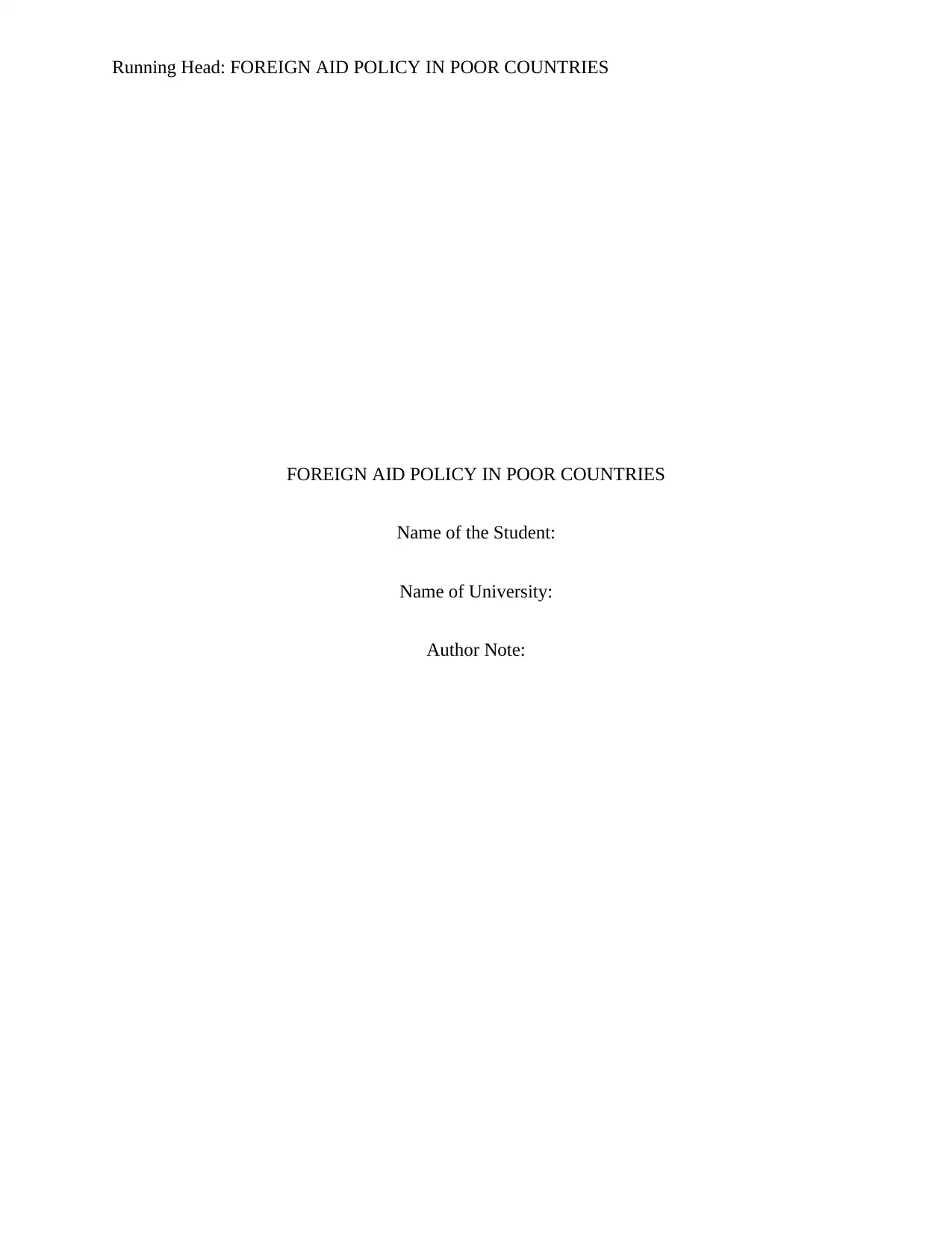
Running Head: FOREIGN AID POLICY IN POOR COUNTRIES
FOREIGN AID POLICY IN POOR COUNTRIES
Name of the Student:
Name of University:
Author Note:
FOREIGN AID POLICY IN POOR COUNTRIES
Name of the Student:
Name of University:
Author Note:
Paraphrase This Document
Need a fresh take? Get an instant paraphrase of this document with our AI Paraphraser
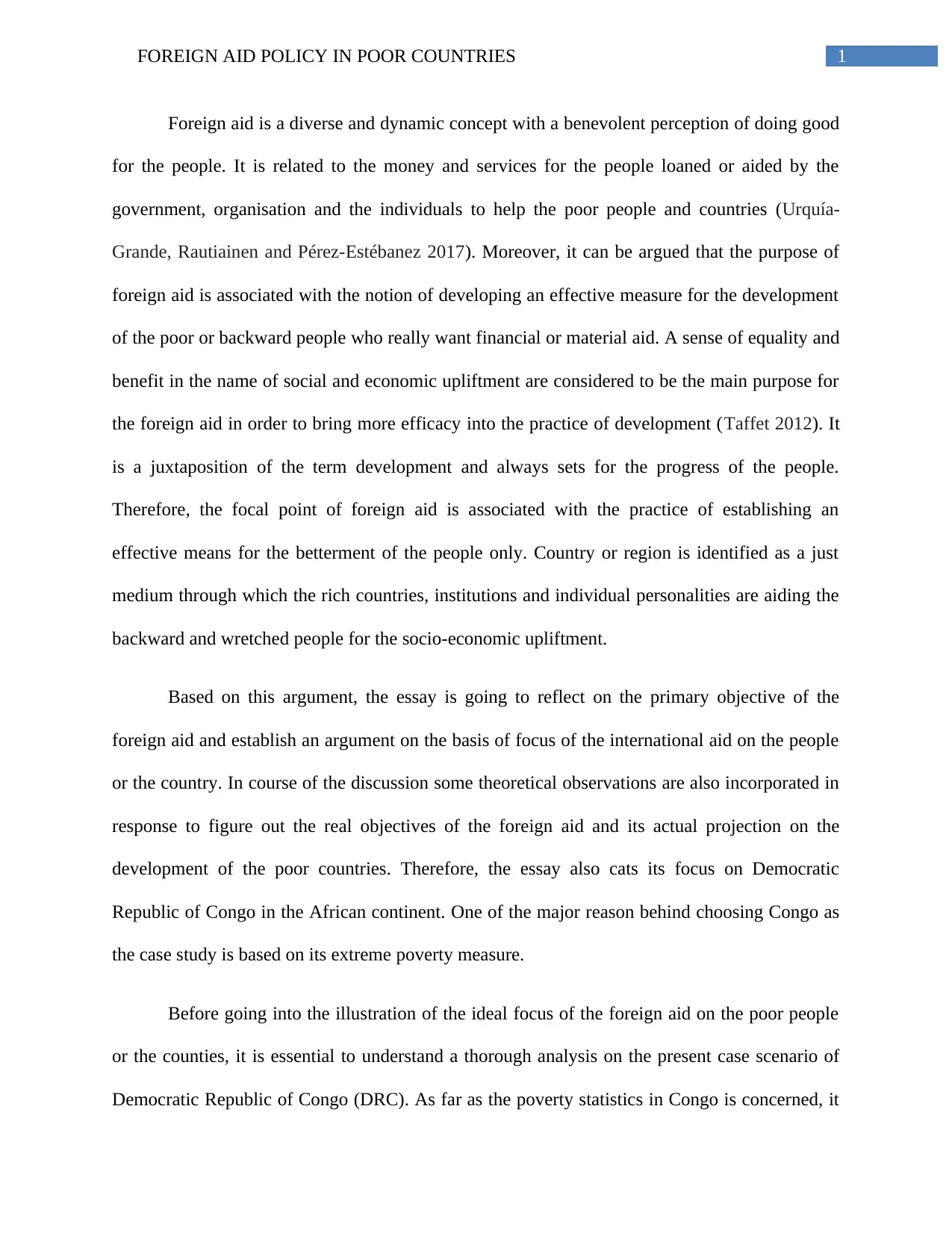
1FOREIGN AID POLICY IN POOR COUNTRIES
Foreign aid is a diverse and dynamic concept with a benevolent perception of doing good
for the people. It is related to the money and services for the people loaned or aided by the
government, organisation and the individuals to help the poor people and countries (Urquía-
Grande, Rautiainen and Pérez-Estébanez 2017). Moreover, it can be argued that the purpose of
foreign aid is associated with the notion of developing an effective measure for the development
of the poor or backward people who really want financial or material aid. A sense of equality and
benefit in the name of social and economic upliftment are considered to be the main purpose for
the foreign aid in order to bring more efficacy into the practice of development (Taffet 2012). It
is a juxtaposition of the term development and always sets for the progress of the people.
Therefore, the focal point of foreign aid is associated with the practice of establishing an
effective means for the betterment of the people only. Country or region is identified as a just
medium through which the rich countries, institutions and individual personalities are aiding the
backward and wretched people for the socio-economic upliftment.
Based on this argument, the essay is going to reflect on the primary objective of the
foreign aid and establish an argument on the basis of focus of the international aid on the people
or the country. In course of the discussion some theoretical observations are also incorporated in
response to figure out the real objectives of the foreign aid and its actual projection on the
development of the poor countries. Therefore, the essay also cats its focus on Democratic
Republic of Congo in the African continent. One of the major reason behind choosing Congo as
the case study is based on its extreme poverty measure.
Before going into the illustration of the ideal focus of the foreign aid on the poor people
or the counties, it is essential to understand a thorough analysis on the present case scenario of
Democratic Republic of Congo (DRC). As far as the poverty statistics in Congo is concerned, it
Foreign aid is a diverse and dynamic concept with a benevolent perception of doing good
for the people. It is related to the money and services for the people loaned or aided by the
government, organisation and the individuals to help the poor people and countries (Urquía-
Grande, Rautiainen and Pérez-Estébanez 2017). Moreover, it can be argued that the purpose of
foreign aid is associated with the notion of developing an effective measure for the development
of the poor or backward people who really want financial or material aid. A sense of equality and
benefit in the name of social and economic upliftment are considered to be the main purpose for
the foreign aid in order to bring more efficacy into the practice of development (Taffet 2012). It
is a juxtaposition of the term development and always sets for the progress of the people.
Therefore, the focal point of foreign aid is associated with the practice of establishing an
effective means for the betterment of the people only. Country or region is identified as a just
medium through which the rich countries, institutions and individual personalities are aiding the
backward and wretched people for the socio-economic upliftment.
Based on this argument, the essay is going to reflect on the primary objective of the
foreign aid and establish an argument on the basis of focus of the international aid on the people
or the country. In course of the discussion some theoretical observations are also incorporated in
response to figure out the real objectives of the foreign aid and its actual projection on the
development of the poor countries. Therefore, the essay also cats its focus on Democratic
Republic of Congo in the African continent. One of the major reason behind choosing Congo as
the case study is based on its extreme poverty measure.
Before going into the illustration of the ideal focus of the foreign aid on the poor people
or the counties, it is essential to understand a thorough analysis on the present case scenario of
Democratic Republic of Congo (DRC). As far as the poverty statistics in Congo is concerned, it
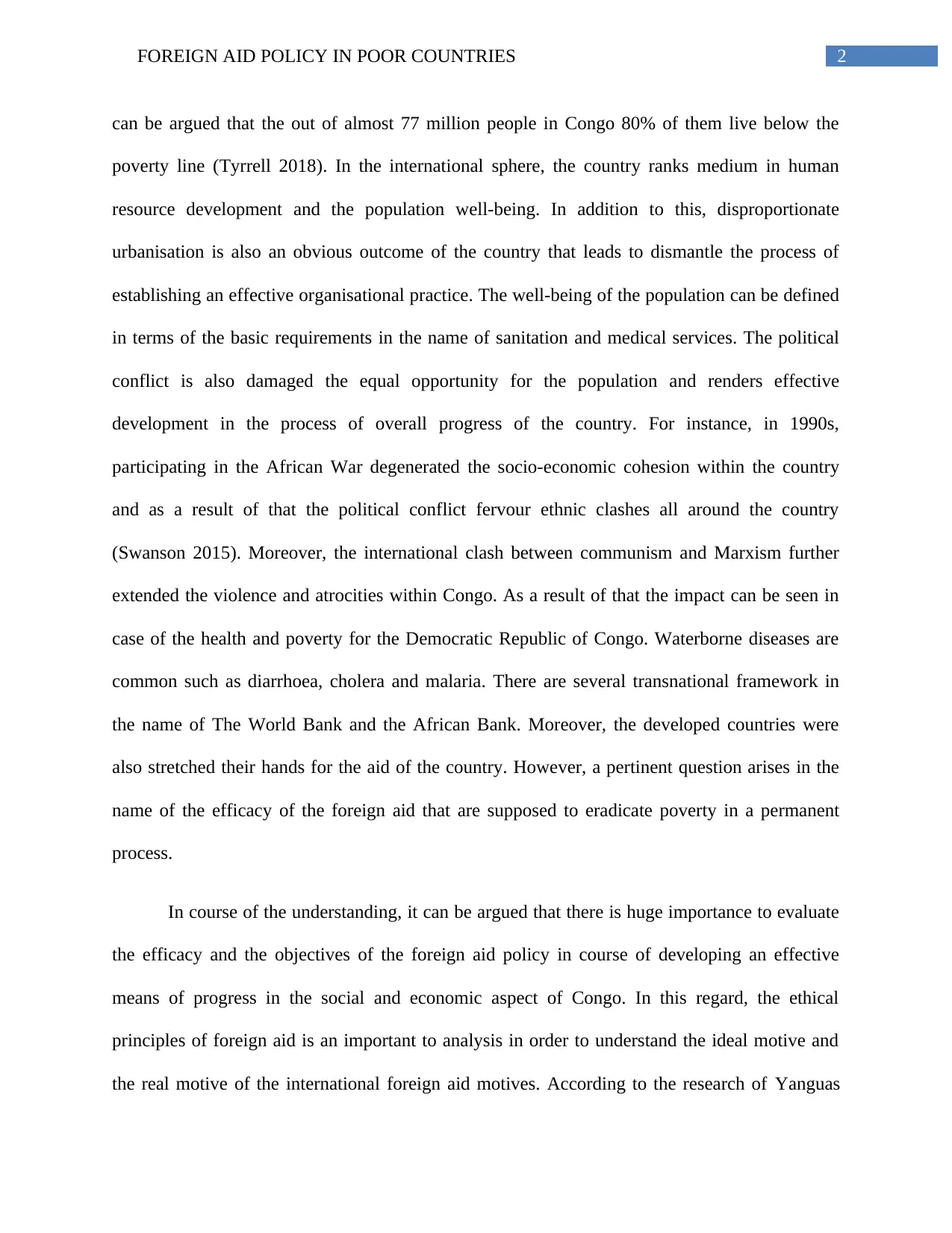
2FOREIGN AID POLICY IN POOR COUNTRIES
can be argued that the out of almost 77 million people in Congo 80% of them live below the
poverty line (Tyrrell 2018). In the international sphere, the country ranks medium in human
resource development and the population well-being. In addition to this, disproportionate
urbanisation is also an obvious outcome of the country that leads to dismantle the process of
establishing an effective organisational practice. The well-being of the population can be defined
in terms of the basic requirements in the name of sanitation and medical services. The political
conflict is also damaged the equal opportunity for the population and renders effective
development in the process of overall progress of the country. For instance, in 1990s,
participating in the African War degenerated the socio-economic cohesion within the country
and as a result of that the political conflict fervour ethnic clashes all around the country
(Swanson 2015). Moreover, the international clash between communism and Marxism further
extended the violence and atrocities within Congo. As a result of that the impact can be seen in
case of the health and poverty for the Democratic Republic of Congo. Waterborne diseases are
common such as diarrhoea, cholera and malaria. There are several transnational framework in
the name of The World Bank and the African Bank. Moreover, the developed countries were
also stretched their hands for the aid of the country. However, a pertinent question arises in the
name of the efficacy of the foreign aid that are supposed to eradicate poverty in a permanent
process.
In course of the understanding, it can be argued that there is huge importance to evaluate
the efficacy and the objectives of the foreign aid policy in course of developing an effective
means of progress in the social and economic aspect of Congo. In this regard, the ethical
principles of foreign aid is an important to analysis in order to understand the ideal motive and
the real motive of the international foreign aid motives. According to the research of Yanguas
can be argued that the out of almost 77 million people in Congo 80% of them live below the
poverty line (Tyrrell 2018). In the international sphere, the country ranks medium in human
resource development and the population well-being. In addition to this, disproportionate
urbanisation is also an obvious outcome of the country that leads to dismantle the process of
establishing an effective organisational practice. The well-being of the population can be defined
in terms of the basic requirements in the name of sanitation and medical services. The political
conflict is also damaged the equal opportunity for the population and renders effective
development in the process of overall progress of the country. For instance, in 1990s,
participating in the African War degenerated the socio-economic cohesion within the country
and as a result of that the political conflict fervour ethnic clashes all around the country
(Swanson 2015). Moreover, the international clash between communism and Marxism further
extended the violence and atrocities within Congo. As a result of that the impact can be seen in
case of the health and poverty for the Democratic Republic of Congo. Waterborne diseases are
common such as diarrhoea, cholera and malaria. There are several transnational framework in
the name of The World Bank and the African Bank. Moreover, the developed countries were
also stretched their hands for the aid of the country. However, a pertinent question arises in the
name of the efficacy of the foreign aid that are supposed to eradicate poverty in a permanent
process.
In course of the understanding, it can be argued that there is huge importance to evaluate
the efficacy and the objectives of the foreign aid policy in course of developing an effective
means of progress in the social and economic aspect of Congo. In this regard, the ethical
principles of foreign aid is an important to analysis in order to understand the ideal motive and
the real motive of the international foreign aid motives. According to the research of Yanguas
⊘ This is a preview!⊘
Do you want full access?
Subscribe today to unlock all pages.

Trusted by 1+ million students worldwide
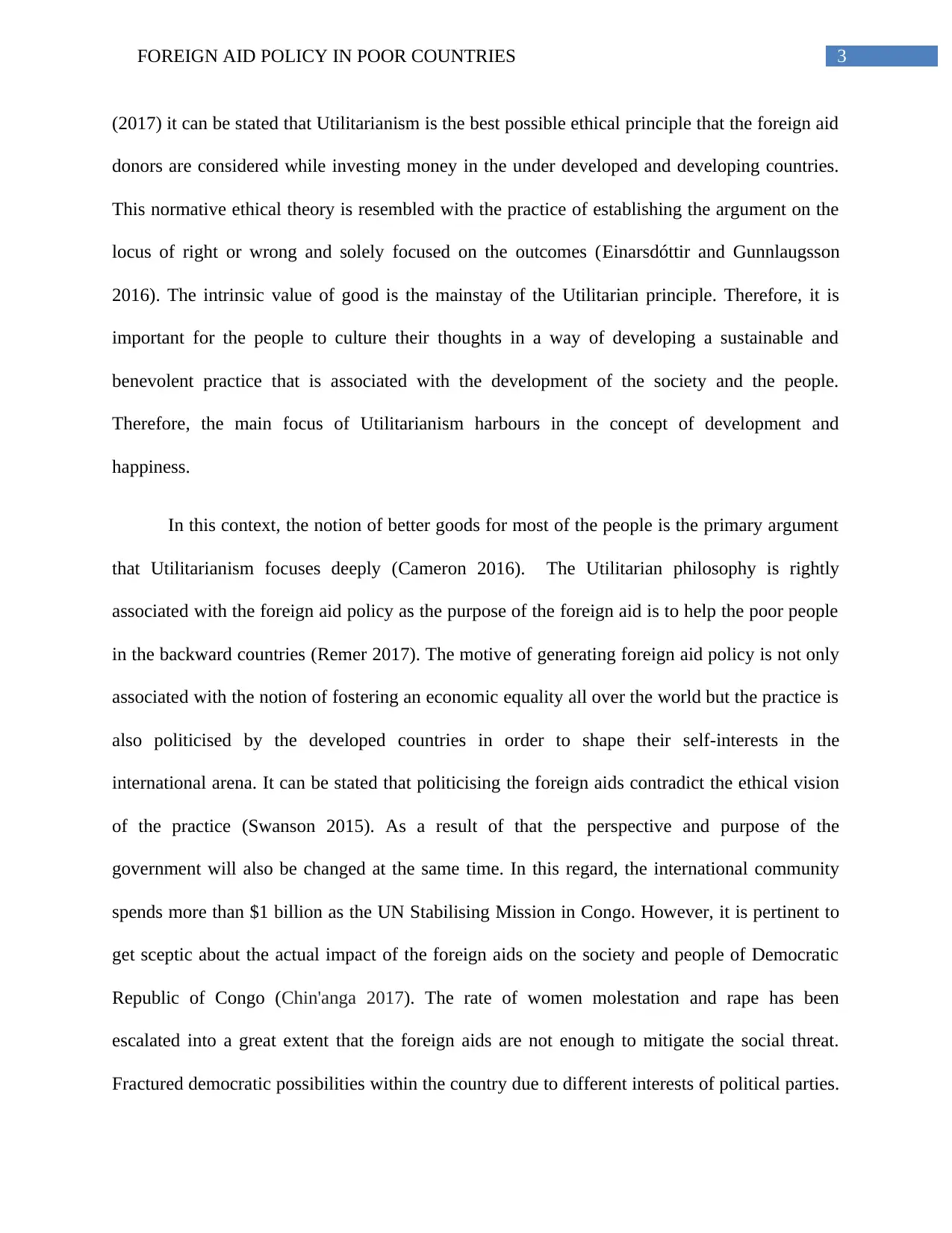
3FOREIGN AID POLICY IN POOR COUNTRIES
(2017) it can be stated that Utilitarianism is the best possible ethical principle that the foreign aid
donors are considered while investing money in the under developed and developing countries.
This normative ethical theory is resembled with the practice of establishing the argument on the
locus of right or wrong and solely focused on the outcomes (Einarsdóttir and Gunnlaugsson
2016). The intrinsic value of good is the mainstay of the Utilitarian principle. Therefore, it is
important for the people to culture their thoughts in a way of developing a sustainable and
benevolent practice that is associated with the development of the society and the people.
Therefore, the main focus of Utilitarianism harbours in the concept of development and
happiness.
In this context, the notion of better goods for most of the people is the primary argument
that Utilitarianism focuses deeply (Cameron 2016). The Utilitarian philosophy is rightly
associated with the foreign aid policy as the purpose of the foreign aid is to help the poor people
in the backward countries (Remer 2017). The motive of generating foreign aid policy is not only
associated with the notion of fostering an economic equality all over the world but the practice is
also politicised by the developed countries in order to shape their self-interests in the
international arena. It can be stated that politicising the foreign aids contradict the ethical vision
of the practice (Swanson 2015). As a result of that the perspective and purpose of the
government will also be changed at the same time. In this regard, the international community
spends more than $1 billion as the UN Stabilising Mission in Congo. However, it is pertinent to
get sceptic about the actual impact of the foreign aids on the society and people of Democratic
Republic of Congo (Chin'anga 2017). The rate of women molestation and rape has been
escalated into a great extent that the foreign aids are not enough to mitigate the social threat.
Fractured democratic possibilities within the country due to different interests of political parties.
(2017) it can be stated that Utilitarianism is the best possible ethical principle that the foreign aid
donors are considered while investing money in the under developed and developing countries.
This normative ethical theory is resembled with the practice of establishing the argument on the
locus of right or wrong and solely focused on the outcomes (Einarsdóttir and Gunnlaugsson
2016). The intrinsic value of good is the mainstay of the Utilitarian principle. Therefore, it is
important for the people to culture their thoughts in a way of developing a sustainable and
benevolent practice that is associated with the development of the society and the people.
Therefore, the main focus of Utilitarianism harbours in the concept of development and
happiness.
In this context, the notion of better goods for most of the people is the primary argument
that Utilitarianism focuses deeply (Cameron 2016). The Utilitarian philosophy is rightly
associated with the foreign aid policy as the purpose of the foreign aid is to help the poor people
in the backward countries (Remer 2017). The motive of generating foreign aid policy is not only
associated with the notion of fostering an economic equality all over the world but the practice is
also politicised by the developed countries in order to shape their self-interests in the
international arena. It can be stated that politicising the foreign aids contradict the ethical vision
of the practice (Swanson 2015). As a result of that the perspective and purpose of the
government will also be changed at the same time. In this regard, the international community
spends more than $1 billion as the UN Stabilising Mission in Congo. However, it is pertinent to
get sceptic about the actual impact of the foreign aids on the society and people of Democratic
Republic of Congo (Chin'anga 2017). The rate of women molestation and rape has been
escalated into a great extent that the foreign aids are not enough to mitigate the social threat.
Fractured democratic possibilities within the country due to different interests of political parties.
Paraphrase This Document
Need a fresh take? Get an instant paraphrase of this document with our AI Paraphraser
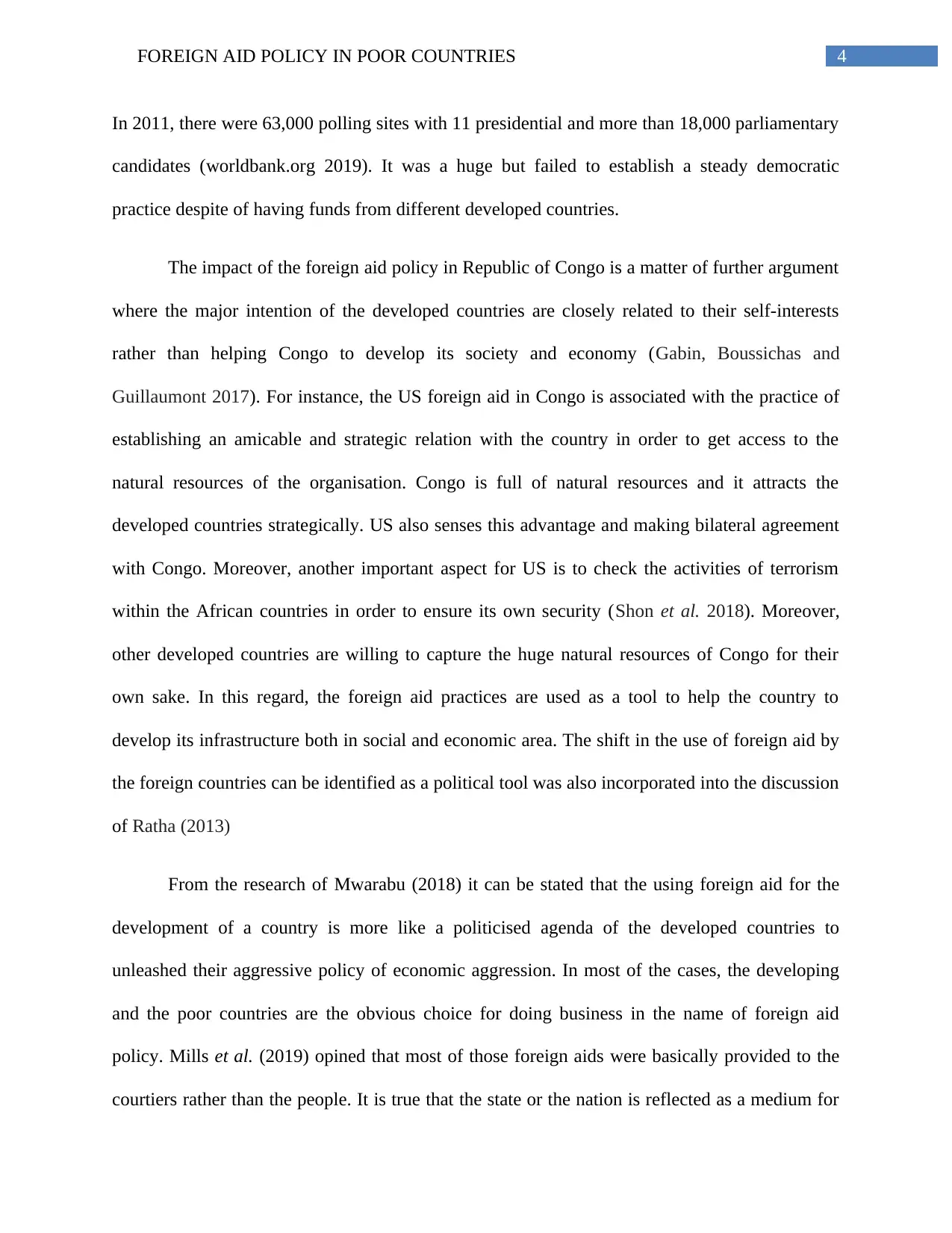
4FOREIGN AID POLICY IN POOR COUNTRIES
In 2011, there were 63,000 polling sites with 11 presidential and more than 18,000 parliamentary
candidates (worldbank.org 2019). It was a huge but failed to establish a steady democratic
practice despite of having funds from different developed countries.
The impact of the foreign aid policy in Republic of Congo is a matter of further argument
where the major intention of the developed countries are closely related to their self-interests
rather than helping Congo to develop its society and economy (Gabin, Boussichas and
Guillaumont 2017). For instance, the US foreign aid in Congo is associated with the practice of
establishing an amicable and strategic relation with the country in order to get access to the
natural resources of the organisation. Congo is full of natural resources and it attracts the
developed countries strategically. US also senses this advantage and making bilateral agreement
with Congo. Moreover, another important aspect for US is to check the activities of terrorism
within the African countries in order to ensure its own security (Shon et al. 2018). Moreover,
other developed countries are willing to capture the huge natural resources of Congo for their
own sake. In this regard, the foreign aid practices are used as a tool to help the country to
develop its infrastructure both in social and economic area. The shift in the use of foreign aid by
the foreign countries can be identified as a political tool was also incorporated into the discussion
of Ratha (2013)
From the research of Mwarabu (2018) it can be stated that the using foreign aid for the
development of a country is more like a politicised agenda of the developed countries to
unleashed their aggressive policy of economic aggression. In most of the cases, the developing
and the poor countries are the obvious choice for doing business in the name of foreign aid
policy. Mills et al. (2019) opined that most of those foreign aids were basically provided to the
courtiers rather than the people. It is true that the state or the nation is reflected as a medium for
In 2011, there were 63,000 polling sites with 11 presidential and more than 18,000 parliamentary
candidates (worldbank.org 2019). It was a huge but failed to establish a steady democratic
practice despite of having funds from different developed countries.
The impact of the foreign aid policy in Republic of Congo is a matter of further argument
where the major intention of the developed countries are closely related to their self-interests
rather than helping Congo to develop its society and economy (Gabin, Boussichas and
Guillaumont 2017). For instance, the US foreign aid in Congo is associated with the practice of
establishing an amicable and strategic relation with the country in order to get access to the
natural resources of the organisation. Congo is full of natural resources and it attracts the
developed countries strategically. US also senses this advantage and making bilateral agreement
with Congo. Moreover, another important aspect for US is to check the activities of terrorism
within the African countries in order to ensure its own security (Shon et al. 2018). Moreover,
other developed countries are willing to capture the huge natural resources of Congo for their
own sake. In this regard, the foreign aid practices are used as a tool to help the country to
develop its infrastructure both in social and economic area. The shift in the use of foreign aid by
the foreign countries can be identified as a political tool was also incorporated into the discussion
of Ratha (2013)
From the research of Mwarabu (2018) it can be stated that the using foreign aid for the
development of a country is more like a politicised agenda of the developed countries to
unleashed their aggressive policy of economic aggression. In most of the cases, the developing
and the poor countries are the obvious choice for doing business in the name of foreign aid
policy. Mills et al. (2019) opined that most of those foreign aids were basically provided to the
courtiers rather than the people. It is true that the state or the nation is reflected as a medium for
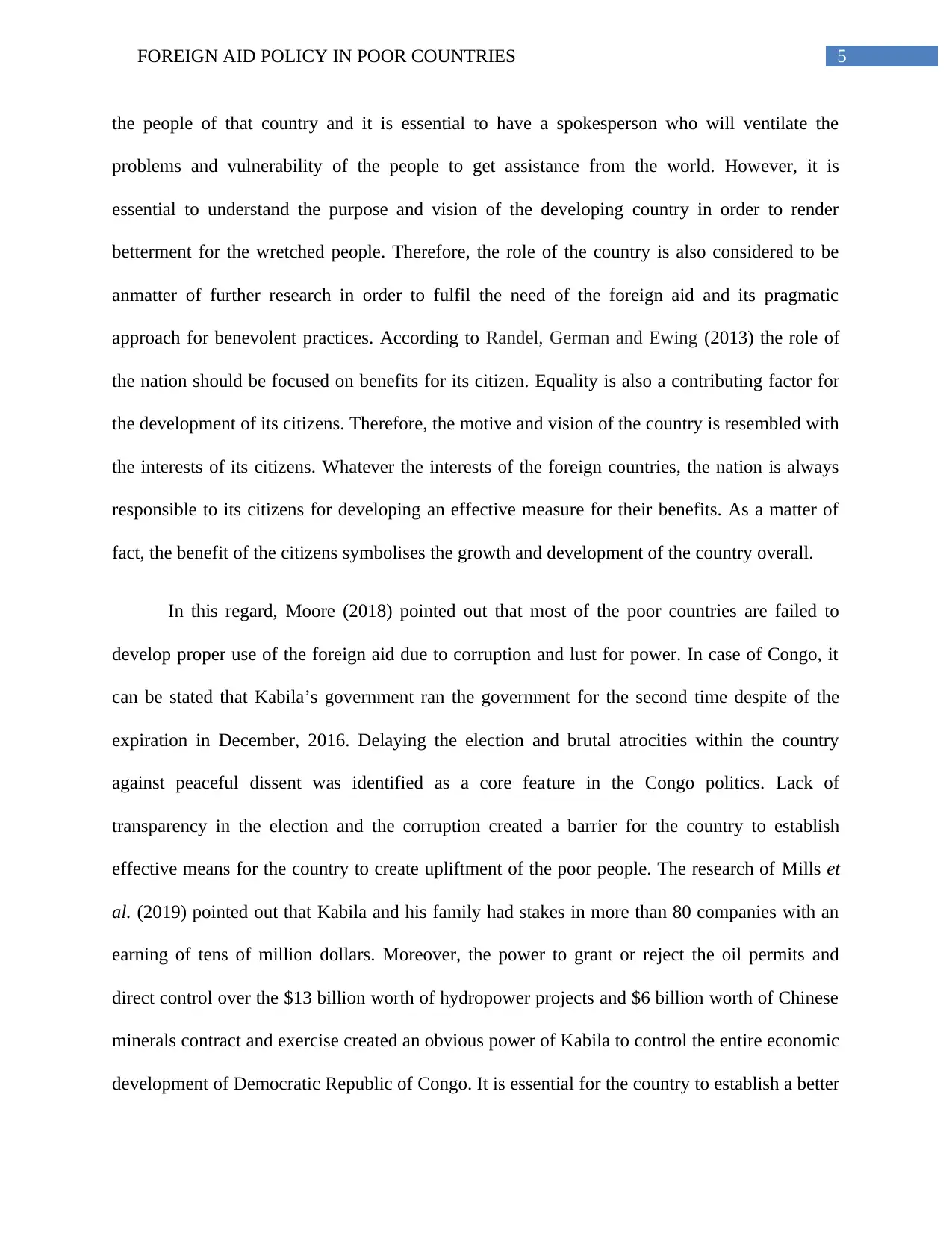
5FOREIGN AID POLICY IN POOR COUNTRIES
the people of that country and it is essential to have a spokesperson who will ventilate the
problems and vulnerability of the people to get assistance from the world. However, it is
essential to understand the purpose and vision of the developing country in order to render
betterment for the wretched people. Therefore, the role of the country is also considered to be
anmatter of further research in order to fulfil the need of the foreign aid and its pragmatic
approach for benevolent practices. According to Randel, German and Ewing (2013) the role of
the nation should be focused on benefits for its citizen. Equality is also a contributing factor for
the development of its citizens. Therefore, the motive and vision of the country is resembled with
the interests of its citizens. Whatever the interests of the foreign countries, the nation is always
responsible to its citizens for developing an effective measure for their benefits. As a matter of
fact, the benefit of the citizens symbolises the growth and development of the country overall.
In this regard, Moore (2018) pointed out that most of the poor countries are failed to
develop proper use of the foreign aid due to corruption and lust for power. In case of Congo, it
can be stated that Kabila’s government ran the government for the second time despite of the
expiration in December, 2016. Delaying the election and brutal atrocities within the country
against peaceful dissent was identified as a core feature in the Congo politics. Lack of
transparency in the election and the corruption created a barrier for the country to establish
effective means for the country to create upliftment of the poor people. The research of Mills et
al. (2019) pointed out that Kabila and his family had stakes in more than 80 companies with an
earning of tens of million dollars. Moreover, the power to grant or reject the oil permits and
direct control over the $13 billion worth of hydropower projects and $6 billion worth of Chinese
minerals contract and exercise created an obvious power of Kabila to control the entire economic
development of Democratic Republic of Congo. It is essential for the country to establish a better
the people of that country and it is essential to have a spokesperson who will ventilate the
problems and vulnerability of the people to get assistance from the world. However, it is
essential to understand the purpose and vision of the developing country in order to render
betterment for the wretched people. Therefore, the role of the country is also considered to be
anmatter of further research in order to fulfil the need of the foreign aid and its pragmatic
approach for benevolent practices. According to Randel, German and Ewing (2013) the role of
the nation should be focused on benefits for its citizen. Equality is also a contributing factor for
the development of its citizens. Therefore, the motive and vision of the country is resembled with
the interests of its citizens. Whatever the interests of the foreign countries, the nation is always
responsible to its citizens for developing an effective measure for their benefits. As a matter of
fact, the benefit of the citizens symbolises the growth and development of the country overall.
In this regard, Moore (2018) pointed out that most of the poor countries are failed to
develop proper use of the foreign aid due to corruption and lust for power. In case of Congo, it
can be stated that Kabila’s government ran the government for the second time despite of the
expiration in December, 2016. Delaying the election and brutal atrocities within the country
against peaceful dissent was identified as a core feature in the Congo politics. Lack of
transparency in the election and the corruption created a barrier for the country to establish
effective means for the country to create upliftment of the poor people. The research of Mills et
al. (2019) pointed out that Kabila and his family had stakes in more than 80 companies with an
earning of tens of million dollars. Moreover, the power to grant or reject the oil permits and
direct control over the $13 billion worth of hydropower projects and $6 billion worth of Chinese
minerals contract and exercise created an obvious power of Kabila to control the entire economic
development of Democratic Republic of Congo. It is essential for the country to establish a better
⊘ This is a preview!⊘
Do you want full access?
Subscribe today to unlock all pages.

Trusted by 1+ million students worldwide
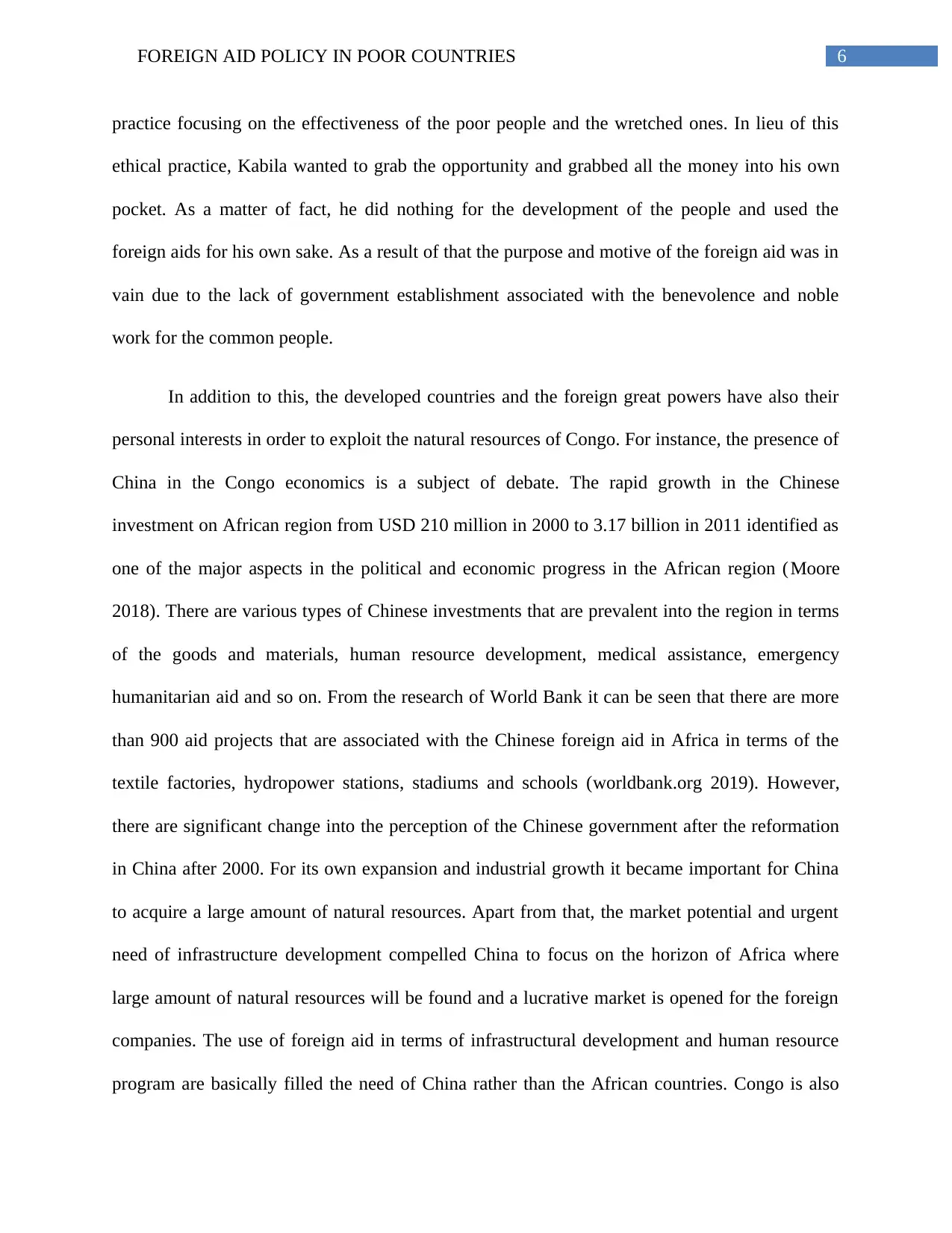
6FOREIGN AID POLICY IN POOR COUNTRIES
practice focusing on the effectiveness of the poor people and the wretched ones. In lieu of this
ethical practice, Kabila wanted to grab the opportunity and grabbed all the money into his own
pocket. As a matter of fact, he did nothing for the development of the people and used the
foreign aids for his own sake. As a result of that the purpose and motive of the foreign aid was in
vain due to the lack of government establishment associated with the benevolence and noble
work for the common people.
In addition to this, the developed countries and the foreign great powers have also their
personal interests in order to exploit the natural resources of Congo. For instance, the presence of
China in the Congo economics is a subject of debate. The rapid growth in the Chinese
investment on African region from USD 210 million in 2000 to 3.17 billion in 2011 identified as
one of the major aspects in the political and economic progress in the African region (Moore
2018). There are various types of Chinese investments that are prevalent into the region in terms
of the goods and materials, human resource development, medical assistance, emergency
humanitarian aid and so on. From the research of World Bank it can be seen that there are more
than 900 aid projects that are associated with the Chinese foreign aid in Africa in terms of the
textile factories, hydropower stations, stadiums and schools (worldbank.org 2019). However,
there are significant change into the perception of the Chinese government after the reformation
in China after 2000. For its own expansion and industrial growth it became important for China
to acquire a large amount of natural resources. Apart from that, the market potential and urgent
need of infrastructure development compelled China to focus on the horizon of Africa where
large amount of natural resources will be found and a lucrative market is opened for the foreign
companies. The use of foreign aid in terms of infrastructural development and human resource
program are basically filled the need of China rather than the African countries. Congo is also
practice focusing on the effectiveness of the poor people and the wretched ones. In lieu of this
ethical practice, Kabila wanted to grab the opportunity and grabbed all the money into his own
pocket. As a matter of fact, he did nothing for the development of the people and used the
foreign aids for his own sake. As a result of that the purpose and motive of the foreign aid was in
vain due to the lack of government establishment associated with the benevolence and noble
work for the common people.
In addition to this, the developed countries and the foreign great powers have also their
personal interests in order to exploit the natural resources of Congo. For instance, the presence of
China in the Congo economics is a subject of debate. The rapid growth in the Chinese
investment on African region from USD 210 million in 2000 to 3.17 billion in 2011 identified as
one of the major aspects in the political and economic progress in the African region (Moore
2018). There are various types of Chinese investments that are prevalent into the region in terms
of the goods and materials, human resource development, medical assistance, emergency
humanitarian aid and so on. From the research of World Bank it can be seen that there are more
than 900 aid projects that are associated with the Chinese foreign aid in Africa in terms of the
textile factories, hydropower stations, stadiums and schools (worldbank.org 2019). However,
there are significant change into the perception of the Chinese government after the reformation
in China after 2000. For its own expansion and industrial growth it became important for China
to acquire a large amount of natural resources. Apart from that, the market potential and urgent
need of infrastructure development compelled China to focus on the horizon of Africa where
large amount of natural resources will be found and a lucrative market is opened for the foreign
companies. The use of foreign aid in terms of infrastructural development and human resource
program are basically filled the need of China rather than the African countries. Congo is also
Paraphrase This Document
Need a fresh take? Get an instant paraphrase of this document with our AI Paraphraser
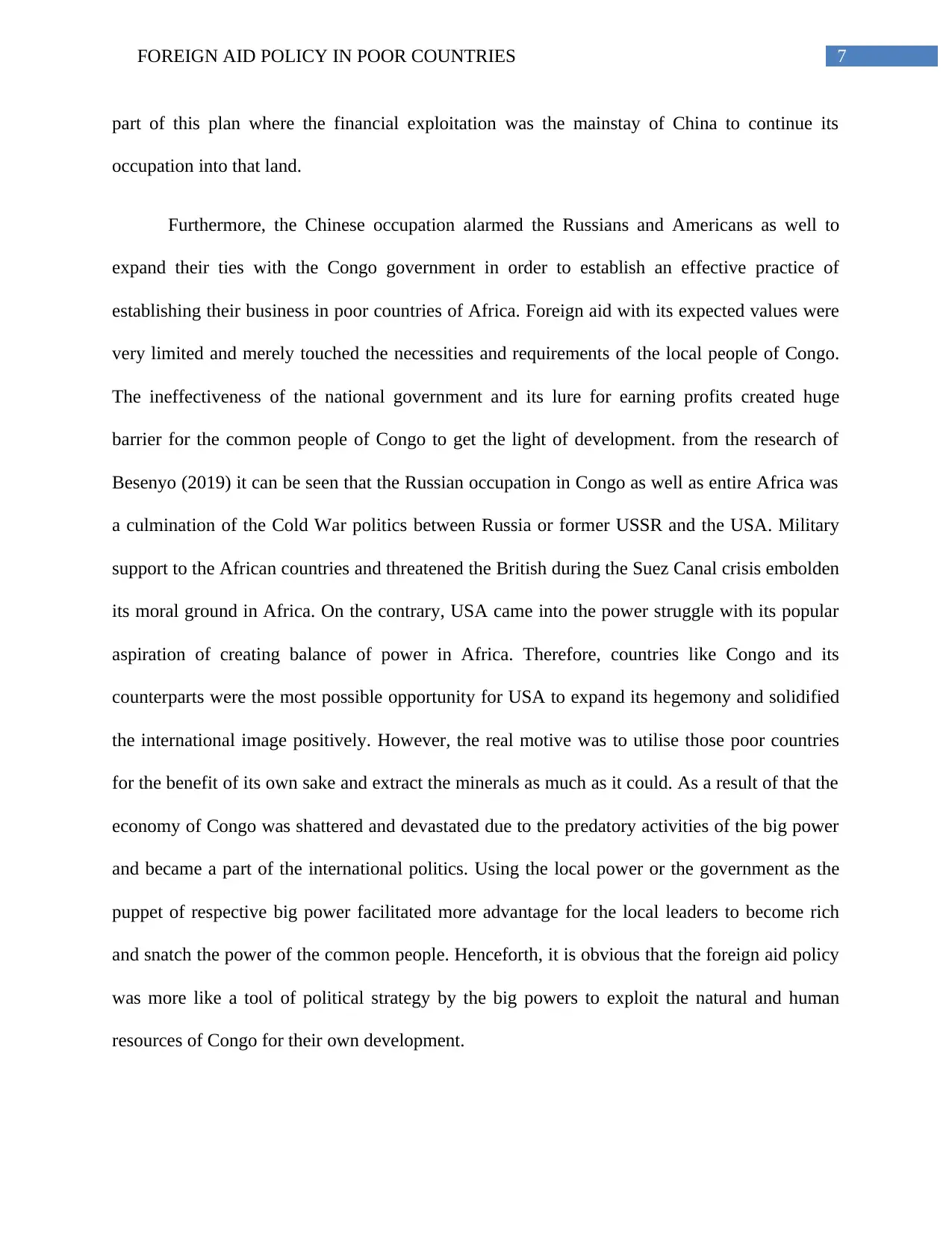
7FOREIGN AID POLICY IN POOR COUNTRIES
part of this plan where the financial exploitation was the mainstay of China to continue its
occupation into that land.
Furthermore, the Chinese occupation alarmed the Russians and Americans as well to
expand their ties with the Congo government in order to establish an effective practice of
establishing their business in poor countries of Africa. Foreign aid with its expected values were
very limited and merely touched the necessities and requirements of the local people of Congo.
The ineffectiveness of the national government and its lure for earning profits created huge
barrier for the common people of Congo to get the light of development. from the research of
Besenyo (2019) it can be seen that the Russian occupation in Congo as well as entire Africa was
a culmination of the Cold War politics between Russia or former USSR and the USA. Military
support to the African countries and threatened the British during the Suez Canal crisis embolden
its moral ground in Africa. On the contrary, USA came into the power struggle with its popular
aspiration of creating balance of power in Africa. Therefore, countries like Congo and its
counterparts were the most possible opportunity for USA to expand its hegemony and solidified
the international image positively. However, the real motive was to utilise those poor countries
for the benefit of its own sake and extract the minerals as much as it could. As a result of that the
economy of Congo was shattered and devastated due to the predatory activities of the big power
and became a part of the international politics. Using the local power or the government as the
puppet of respective big power facilitated more advantage for the local leaders to become rich
and snatch the power of the common people. Henceforth, it is obvious that the foreign aid policy
was more like a tool of political strategy by the big powers to exploit the natural and human
resources of Congo for their own development.
part of this plan where the financial exploitation was the mainstay of China to continue its
occupation into that land.
Furthermore, the Chinese occupation alarmed the Russians and Americans as well to
expand their ties with the Congo government in order to establish an effective practice of
establishing their business in poor countries of Africa. Foreign aid with its expected values were
very limited and merely touched the necessities and requirements of the local people of Congo.
The ineffectiveness of the national government and its lure for earning profits created huge
barrier for the common people of Congo to get the light of development. from the research of
Besenyo (2019) it can be seen that the Russian occupation in Congo as well as entire Africa was
a culmination of the Cold War politics between Russia or former USSR and the USA. Military
support to the African countries and threatened the British during the Suez Canal crisis embolden
its moral ground in Africa. On the contrary, USA came into the power struggle with its popular
aspiration of creating balance of power in Africa. Therefore, countries like Congo and its
counterparts were the most possible opportunity for USA to expand its hegemony and solidified
the international image positively. However, the real motive was to utilise those poor countries
for the benefit of its own sake and extract the minerals as much as it could. As a result of that the
economy of Congo was shattered and devastated due to the predatory activities of the big power
and became a part of the international politics. Using the local power or the government as the
puppet of respective big power facilitated more advantage for the local leaders to become rich
and snatch the power of the common people. Henceforth, it is obvious that the foreign aid policy
was more like a tool of political strategy by the big powers to exploit the natural and human
resources of Congo for their own development.
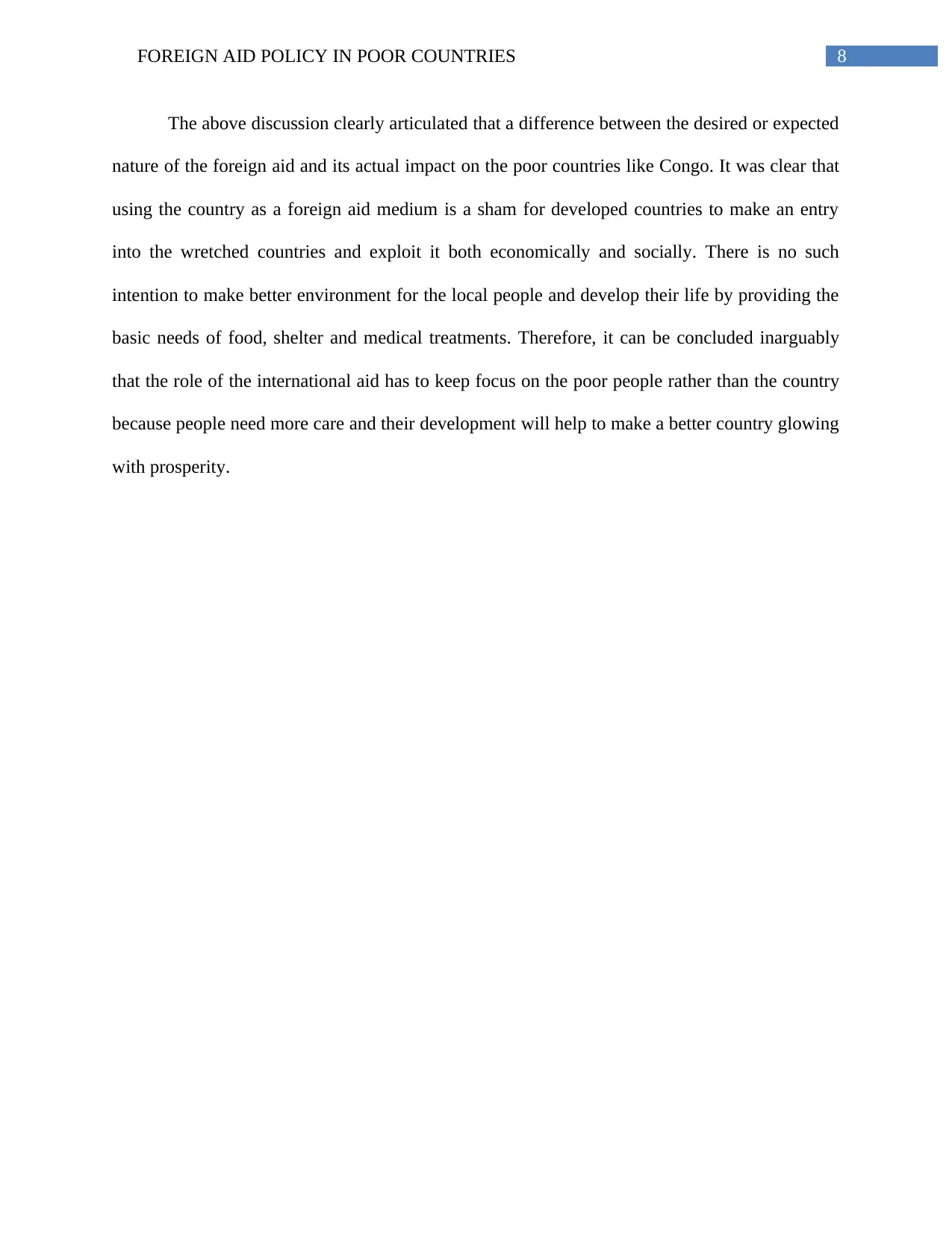
8FOREIGN AID POLICY IN POOR COUNTRIES
The above discussion clearly articulated that a difference between the desired or expected
nature of the foreign aid and its actual impact on the poor countries like Congo. It was clear that
using the country as a foreign aid medium is a sham for developed countries to make an entry
into the wretched countries and exploit it both economically and socially. There is no such
intention to make better environment for the local people and develop their life by providing the
basic needs of food, shelter and medical treatments. Therefore, it can be concluded inarguably
that the role of the international aid has to keep focus on the poor people rather than the country
because people need more care and their development will help to make a better country glowing
with prosperity.
The above discussion clearly articulated that a difference between the desired or expected
nature of the foreign aid and its actual impact on the poor countries like Congo. It was clear that
using the country as a foreign aid medium is a sham for developed countries to make an entry
into the wretched countries and exploit it both economically and socially. There is no such
intention to make better environment for the local people and develop their life by providing the
basic needs of food, shelter and medical treatments. Therefore, it can be concluded inarguably
that the role of the international aid has to keep focus on the poor people rather than the country
because people need more care and their development will help to make a better country glowing
with prosperity.
⊘ This is a preview!⊘
Do you want full access?
Subscribe today to unlock all pages.

Trusted by 1+ million students worldwide
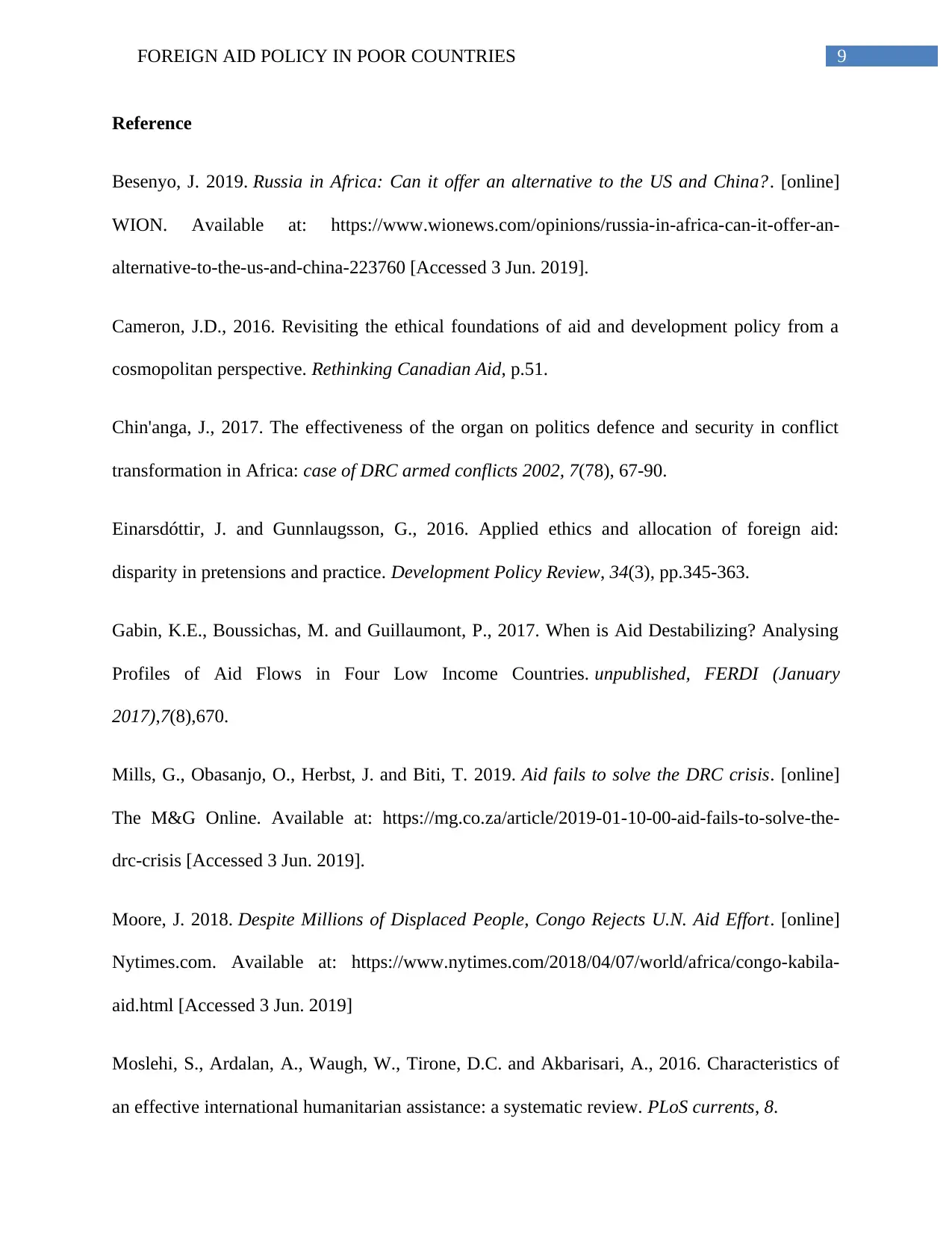
9FOREIGN AID POLICY IN POOR COUNTRIES
Reference
Besenyo, J. 2019. Russia in Africa: Can it offer an alternative to the US and China?. [online]
WION. Available at: https://www.wionews.com/opinions/russia-in-africa-can-it-offer-an-
alternative-to-the-us-and-china-223760 [Accessed 3 Jun. 2019].
Cameron, J.D., 2016. Revisiting the ethical foundations of aid and development policy from a
cosmopolitan perspective. Rethinking Canadian Aid, p.51.
Chin'anga, J., 2017. The effectiveness of the organ on politics defence and security in conflict
transformation in Africa: case of DRC armed conflicts 2002, 7(78), 67-90.
Einarsdóttir, J. and Gunnlaugsson, G., 2016. Applied ethics and allocation of foreign aid:
disparity in pretensions and practice. Development Policy Review, 34(3), pp.345-363.
Gabin, K.E., Boussichas, M. and Guillaumont, P., 2017. When is Aid Destabilizing? Analysing
Profiles of Aid Flows in Four Low Income Countries. unpublished, FERDI (January
2017),7(8),670.
Mills, G., Obasanjo, O., Herbst, J. and Biti, T. 2019. Aid fails to solve the DRC crisis. [online]
The M&G Online. Available at: https://mg.co.za/article/2019-01-10-00-aid-fails-to-solve-the-
drc-crisis [Accessed 3 Jun. 2019].
Moore, J. 2018. Despite Millions of Displaced People, Congo Rejects U.N. Aid Effort. [online]
Nytimes.com. Available at: https://www.nytimes.com/2018/04/07/world/africa/congo-kabila-
aid.html [Accessed 3 Jun. 2019]
Moslehi, S., Ardalan, A., Waugh, W., Tirone, D.C. and Akbarisari, A., 2016. Characteristics of
an effective international humanitarian assistance: a systematic review. PLoS currents, 8.
Reference
Besenyo, J. 2019. Russia in Africa: Can it offer an alternative to the US and China?. [online]
WION. Available at: https://www.wionews.com/opinions/russia-in-africa-can-it-offer-an-
alternative-to-the-us-and-china-223760 [Accessed 3 Jun. 2019].
Cameron, J.D., 2016. Revisiting the ethical foundations of aid and development policy from a
cosmopolitan perspective. Rethinking Canadian Aid, p.51.
Chin'anga, J., 2017. The effectiveness of the organ on politics defence and security in conflict
transformation in Africa: case of DRC armed conflicts 2002, 7(78), 67-90.
Einarsdóttir, J. and Gunnlaugsson, G., 2016. Applied ethics and allocation of foreign aid:
disparity in pretensions and practice. Development Policy Review, 34(3), pp.345-363.
Gabin, K.E., Boussichas, M. and Guillaumont, P., 2017. When is Aid Destabilizing? Analysing
Profiles of Aid Flows in Four Low Income Countries. unpublished, FERDI (January
2017),7(8),670.
Mills, G., Obasanjo, O., Herbst, J. and Biti, T. 2019. Aid fails to solve the DRC crisis. [online]
The M&G Online. Available at: https://mg.co.za/article/2019-01-10-00-aid-fails-to-solve-the-
drc-crisis [Accessed 3 Jun. 2019].
Moore, J. 2018. Despite Millions of Displaced People, Congo Rejects U.N. Aid Effort. [online]
Nytimes.com. Available at: https://www.nytimes.com/2018/04/07/world/africa/congo-kabila-
aid.html [Accessed 3 Jun. 2019]
Moslehi, S., Ardalan, A., Waugh, W., Tirone, D.C. and Akbarisari, A., 2016. Characteristics of
an effective international humanitarian assistance: a systematic review. PLoS currents, 8.
Paraphrase This Document
Need a fresh take? Get an instant paraphrase of this document with our AI Paraphraser
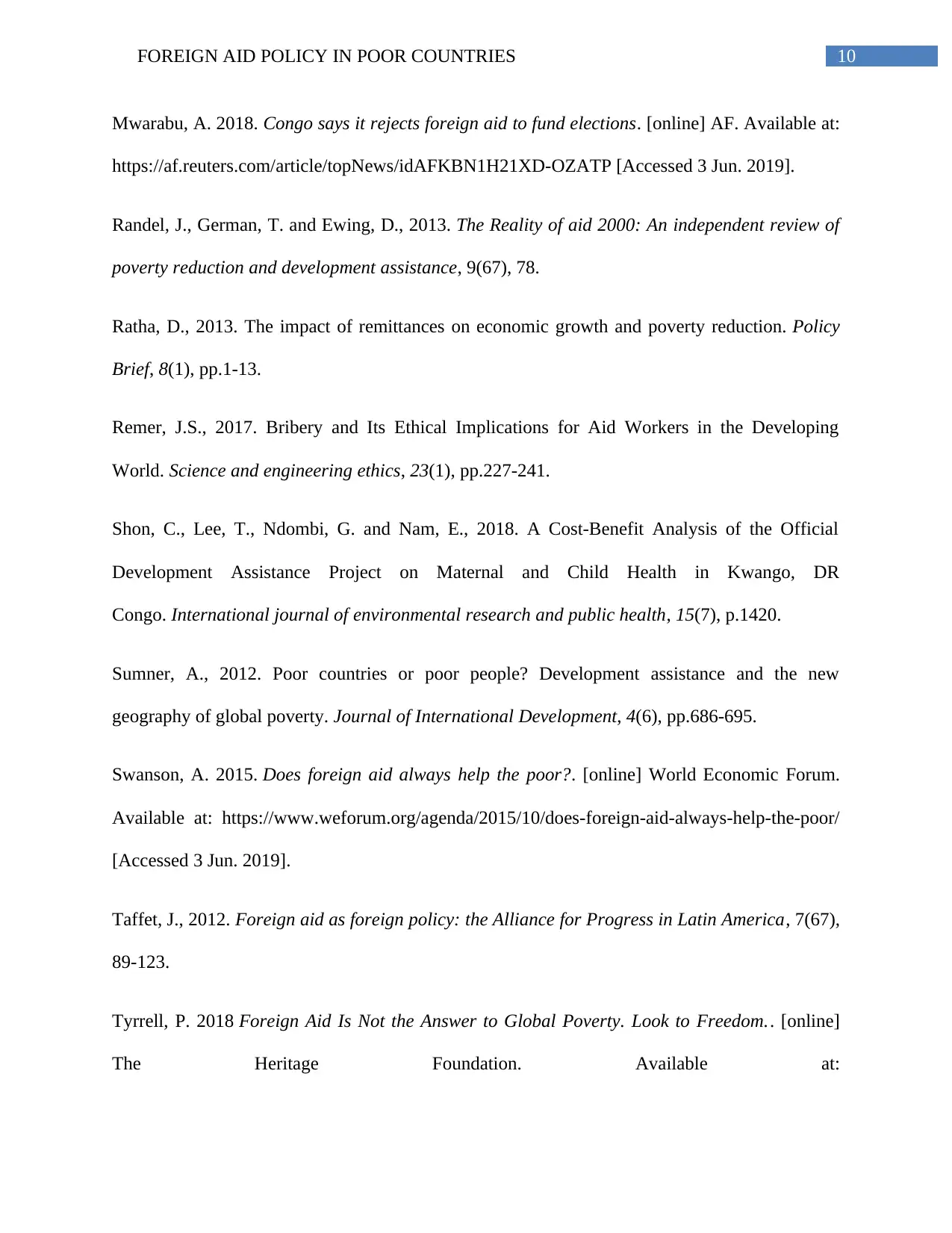
10FOREIGN AID POLICY IN POOR COUNTRIES
Mwarabu, A. 2018. Congo says it rejects foreign aid to fund elections. [online] AF. Available at:
https://af.reuters.com/article/topNews/idAFKBN1H21XD-OZATP [Accessed 3 Jun. 2019].
Randel, J., German, T. and Ewing, D., 2013. The Reality of aid 2000: An independent review of
poverty reduction and development assistance, 9(67), 78.
Ratha, D., 2013. The impact of remittances on economic growth and poverty reduction. Policy
Brief, 8(1), pp.1-13.
Remer, J.S., 2017. Bribery and Its Ethical Implications for Aid Workers in the Developing
World. Science and engineering ethics, 23(1), pp.227-241.
Shon, C., Lee, T., Ndombi, G. and Nam, E., 2018. A Cost-Benefit Analysis of the Official
Development Assistance Project on Maternal and Child Health in Kwango, DR
Congo. International journal of environmental research and public health, 15(7), p.1420.
Sumner, A., 2012. Poor countries or poor people? Development assistance and the new
geography of global poverty. Journal of International Development, 4(6), pp.686-695.
Swanson, A. 2015. Does foreign aid always help the poor?. [online] World Economic Forum.
Available at: https://www.weforum.org/agenda/2015/10/does-foreign-aid-always-help-the-poor/
[Accessed 3 Jun. 2019].
Taffet, J., 2012. Foreign aid as foreign policy: the Alliance for Progress in Latin America, 7(67),
89-123.
Tyrrell, P. 2018 Foreign Aid Is Not the Answer to Global Poverty. Look to Freedom.. [online]
The Heritage Foundation. Available at:
Mwarabu, A. 2018. Congo says it rejects foreign aid to fund elections. [online] AF. Available at:
https://af.reuters.com/article/topNews/idAFKBN1H21XD-OZATP [Accessed 3 Jun. 2019].
Randel, J., German, T. and Ewing, D., 2013. The Reality of aid 2000: An independent review of
poverty reduction and development assistance, 9(67), 78.
Ratha, D., 2013. The impact of remittances on economic growth and poverty reduction. Policy
Brief, 8(1), pp.1-13.
Remer, J.S., 2017. Bribery and Its Ethical Implications for Aid Workers in the Developing
World. Science and engineering ethics, 23(1), pp.227-241.
Shon, C., Lee, T., Ndombi, G. and Nam, E., 2018. A Cost-Benefit Analysis of the Official
Development Assistance Project on Maternal and Child Health in Kwango, DR
Congo. International journal of environmental research and public health, 15(7), p.1420.
Sumner, A., 2012. Poor countries or poor people? Development assistance and the new
geography of global poverty. Journal of International Development, 4(6), pp.686-695.
Swanson, A. 2015. Does foreign aid always help the poor?. [online] World Economic Forum.
Available at: https://www.weforum.org/agenda/2015/10/does-foreign-aid-always-help-the-poor/
[Accessed 3 Jun. 2019].
Taffet, J., 2012. Foreign aid as foreign policy: the Alliance for Progress in Latin America, 7(67),
89-123.
Tyrrell, P. 2018 Foreign Aid Is Not the Answer to Global Poverty. Look to Freedom.. [online]
The Heritage Foundation. Available at:
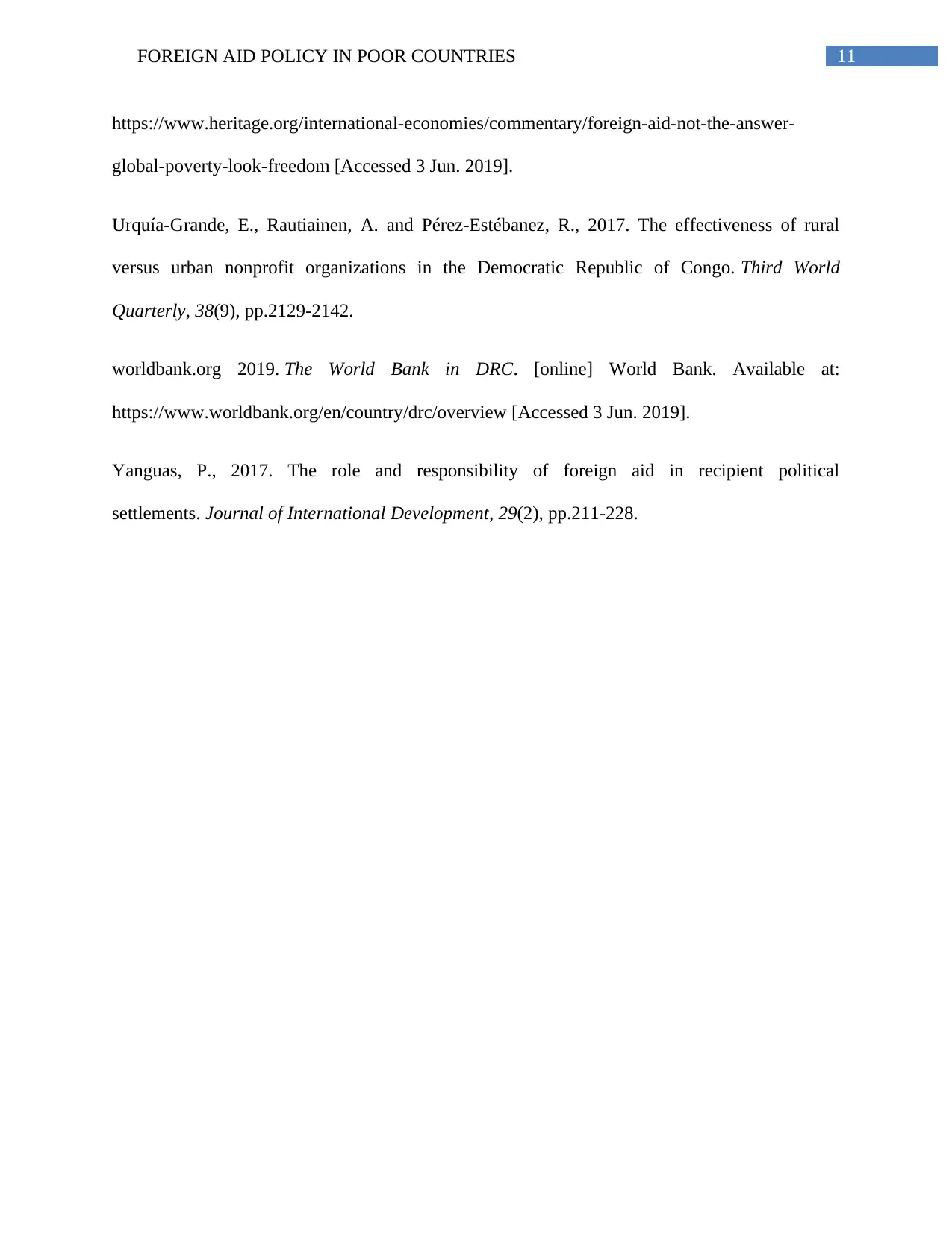
11FOREIGN AID POLICY IN POOR COUNTRIES
https://www.heritage.org/international-economies/commentary/foreign-aid-not-the-answer-
global-poverty-look-freedom [Accessed 3 Jun. 2019].
Urquía-Grande, E., Rautiainen, A. and Pérez-Estébanez, R., 2017. The effectiveness of rural
versus urban nonprofit organizations in the Democratic Republic of Congo. Third World
Quarterly, 38(9), pp.2129-2142.
worldbank.org 2019. The World Bank in DRC. [online] World Bank. Available at:
https://www.worldbank.org/en/country/drc/overview [Accessed 3 Jun. 2019].
Yanguas, P., 2017. The role and responsibility of foreign aid in recipient political
settlements. Journal of International Development, 29(2), pp.211-228.
https://www.heritage.org/international-economies/commentary/foreign-aid-not-the-answer-
global-poverty-look-freedom [Accessed 3 Jun. 2019].
Urquía-Grande, E., Rautiainen, A. and Pérez-Estébanez, R., 2017. The effectiveness of rural
versus urban nonprofit organizations in the Democratic Republic of Congo. Third World
Quarterly, 38(9), pp.2129-2142.
worldbank.org 2019. The World Bank in DRC. [online] World Bank. Available at:
https://www.worldbank.org/en/country/drc/overview [Accessed 3 Jun. 2019].
Yanguas, P., 2017. The role and responsibility of foreign aid in recipient political
settlements. Journal of International Development, 29(2), pp.211-228.
⊘ This is a preview!⊘
Do you want full access?
Subscribe today to unlock all pages.

Trusted by 1+ million students worldwide
1 out of 12
Related Documents
Your All-in-One AI-Powered Toolkit for Academic Success.
+13062052269
info@desklib.com
Available 24*7 on WhatsApp / Email
![[object Object]](/_next/static/media/star-bottom.7253800d.svg)
Unlock your academic potential
Copyright © 2020–2026 A2Z Services. All Rights Reserved. Developed and managed by ZUCOL.




